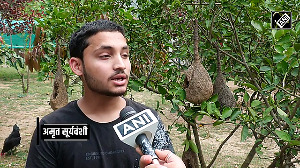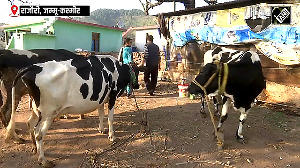Whether Rajeev Chandrasekhar wins or not, Thiruvananthapuram will likely never see such an interesting contest again.

Rajeev Chandrasekhar has many throwaway lines to his credit. But the most memorable one has to be his declaration during a TV discussion that 'It is the fundamental right of journalists to be wrong.'
As he contests his first Lok Sabha election, he may be fighting one of the most challenging battles in his life.
Whether he wins or not, Thiruvananthapuram will likely never see such an interesting contest again.
Mr Chandrasekhar's transition from being a techie to becoming a public servant in India has been a long, chequered journey.
His father, Air Commodore M K Chandrasekhar, was highly regarded in the Indian Air Force.
His early exposure to the armed forces made Mr Chandrasekhar a devout devotee of the culture of the armed forces: He consistently fought battles for the defence services, whether it was to hold extensive discussions on One Rank One Pension (OROP) with the late Manohar Parrikar, then India's defence minister, or something as unexciting as better facilities for the nursing staff in the medical corps.
It was because of his efforts that a Dakota DC-3 aircraft of 1940 vintage, a legendary transport aircraft destined for the scrapheap in the UK, was bought by him, restored to flying condition, and gifted to the Indian Air Force in 2018.
Mr Chandrasekhar says he could not countenance the fact that an aircraft that served India so well in the war of liberation for Bangladesh could be sold as scrap -- one of these aircraft is today a prized possession of the Bangladesh war museum in memory of Mukti Joddhas (liberation fighters).
Mr Chandrasekhar opted to become an electrical engineer at the Manipal Institute of Technology, going on to the United States in 1984 for a postgraduate degree.
He was spotted by Vinod Dham, then not as well known as he is today.
He says it was Mr Dham's influence that led him to Intel, where he became one of only three engineers who were CPU architects, working on the next generation of chips.
In the US he met Anju, who was studying for an MBA and would later become his wife.
Anju was daughter of one of Kerala's most respected entrepreneurs, T P Gopalan Nambiar.
Nambiar had begun life in Palakkad in 1963, manufacturing panel meters for the defence forces, but moved to Bangalore to protect his business from the industry-unfriendly atmosphere in Kerala then.
He expanded his range and moved to new businesses including consumer electronics and communications: BPL Communications, the holding company for BPL Mobile Communications and BPL Cellular, which was run by son-in-law Chandrasekhar, who had returned to India, fired by Rajiv Gandhi's plans for a tech transformation of India's communication systems.
In 1991, he was among those who bid for cellular licences.
By 2001, BPL Mobile was the largest cellular operator in India.
He then tried to do a deal by merging his company into a consortium. It didn't work out.
In a way, Mr Chandrasekhar paid the price for being an early mover in a business that was at best perilous. The business had to be sold for an undisclosed sum.

Mr Chandrasekhar exited BPL Mobile in 2005. By then he had seen first hand the tentacles of politics in business.
In 2006, he became an Independent member of the Rajya Sabha, following it up with another term in 2012.
In between, he joined the Bharatiya Janata Party and became a Rajya Sabha member again in 2018.
He played a crucial role in framing the Digital Personal Data Protection Act, 2023.
The BJP trusted him enough to put him in charge of the Puducherry assembly election in 2021, along with senior party colleague Nirmal Surana. The duo managed to install a National Democratic Alliance government there.
Within months, Mr Chandrasekhar became central minister of skill development and electronics.
He got the first inkling he might have to fight another battle when the prime minister said to him quietly after he became minister: 'Aap apne prant ke kapde pehanna shuru keejiye (start donning the attire of the region you belong to).'
Mr Chandrasekhar has made many friends. No matter how busy he is, he always has time for them --and for his passion to make India a little bit better.
Feature Presentation: Aslam Hunani/Rediff.com












 © 2025
© 2025